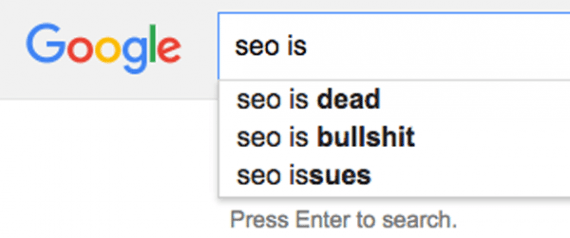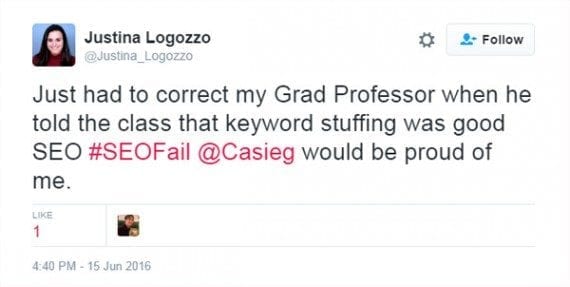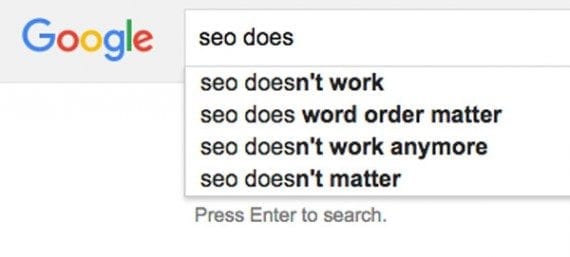
Search engine optimization has something of a bad reputation, in part, because it is sometimes associated with unethical, black hat practices. Thus, some of the most popular searches on Google are unflattering.
If you start to type “seo is” into Google, the king of search engines is likely to autosuggest that “seo is dead” or that “seo is bullsh**,” leaving you to wonder how one of the most prominent forms of online marketing has, apparently, earned a bad reputation.
Search engine optimization, at its most pure, is the act of ensuring search engine spiders (bots) can find a web page, discover the page’s purpose or meaning, and catalog (index) the page’s content for future reference. It focuses on users first, organizing pages so that they are easy for people to read and understand, knowing that when a page is well organized for a person, a search engine can understand it too.
The idea is that if a search engine can know what a page has to offer, it can show that page in response to a relevant search query.
Any business owner or manager who wants to attract new customers can understand the value of optimizing for search and any developer who has ever written a search bot understands how much easier it is to scrape a well-structured page.
So what’s gone wrong for SEO?
1. Unscrupulous, Unsolicited SEO Emails
Many pitches from self-proclaimed SEO experts are, in fact, unscrupulous, deceptive, and fraudulent. Here is an example. It is similar to a couple dozen that arrive in my email each week.
Dear Team,
Hope you are doing well.
My name is Arnold Kross, SEO expert of a Leading SEO service provider company. As per my analysis, your website is not performing well in the Google organic search as well as your traffic / visitor is poor from the last couple of months due to some of the reasons.
You might know about the frequent Google updates and as per the latest update, Google has completely dropped all authorship functionality from the search results and webmaster tools. So be careful with it and take the help of an SEO company to fix it.
The irony here is that Arnold Kross, which we suppose is a pseudonym, is sending email spam, but the reader is likely to blame the SEO industry.
Finding: The notion that only an SEO company can “fix” problems is is a misconception, but it may still be hurting SEO’s reputation. Crooks will be crooks.
2. Keyword Stuffing
Keyword stuffing is the practice of repeating keywords on a page in an attempt to manipulate search engine results. Here is an example, directly from Google’s search console (emphasis added).
We sell custom cigar humidors. Our custom cigar humidors are handmade. If you’re thinking of buying a custom cigar humidor, please contact our custom cigar humidor specialists at custom.cigar.humidors@example.com.
Closely related to the myth of keyword density, keyword stuffing was once a common SEO practice. It is no longer effective and, now, is likely to get your website penalized.
Most legitimate SEO practitioners discourage keyword stuffing and discussions of keyword density, but it still happens. In fact, a quick Twitter search on June 16, 2016 discovered a post from Justina Logozzo, search engine marketing manager at KoMarketing, a B2B marketing firm, “Just had to correct my Grad Professor when he told the class that keyword stuffing was good SEO.”

Justina Logozzo’s tweet from June 16 shows that keyword stuffing is still taught.
Finding: Keyword stuffing was a common SEO practice. It has mostly stopped because search engines are combatting it.
3. Buying or Trading Links
Some SEO practitioners or website owners will buy links with the intent of manipulating search engine rankings. This is different than buying an advertisement, which should be clearly identified as a promotion and include a nofollow link. Rather, paid or traded links are specifically aimed at generating fake page authority and tricking search engines.
The practice is deceptive at its core, since a person reading the source page and the search engine bot indexing it do not understand that there is a material relationship between the two sites.
Google, Bing, and, presumably, all legitimate search engines will penalize a site for paid or traded links, so experts now discourage the practice.
“We no longer recommend paid links, link ads, like buying or selling to any of our active clients,” wrote Rand Fishkin of Moz in a September 2009 post.
Finding: The SEO industry is turning away from paid links because of the consequences, not the ethics — thus the impact on reputation.
4. Doorway Pages and Cloaking
Good SEO should provide content and features for people first, then structure that content in a way that spiders from Google, Bing, and the like can understand.
Doorway pages and cloaking are the antitheses of good SEO.
A doorway page is an HTML page loaded with content and keywords intended to rank the page for one topic. When a search spider visits, the page shows this content, hoping to get indexed and ranked. But when a person visits the page, it redirects them a different, possibly, unrelated website. Search engines see much different content than humans do.
The doorway pages’ purpose is to funnel traffic. It depends on tricking search engines, and it can be very bad for the folks searching Google. It is a web page created specifically for search engines and never intended for people. It doesn’t want to be read. It just wants to trick you.
Google addressed doorway pages as recently as March of 2015.
Cloaking is similar. The search engine’s spider is shown different content than what a user — a person — would see. Doorway pages use a meta refresh or a bit of JavaScript to redirect the user, while cloaking is likely to use the server to show different content. In 2011, Matt Cutts, the former head of web spam at Google, posted a video describing cloaking.
Finding: Doorway pages and cloaking are common, albeit black hat, SEO practices. Any SEO practitioner using doorway pages or cloaking deserves a bad reputation.
5. Hidden Text or Links
Hiding text or links on a page are sort of like cloaking, but less sophisticated. The idea is, again, to show search engine spiders different content than a user sees.
Google describes, in its Search Console, five ways folks try to hide text or links.
- Using white text on a white background.
- Locating text behind an image.
- Using CSS to position text off-screen.
- Setting the font size to 0.
- Hiding a link by only linking one small character — for example, a hyphen in the middle of a paragraph.
Finding: While this almost certainly is not an SEO technique that reputable SEO firms or practitioners would recommend, it is still associated with SEO and may be impacting the industry’s reputation.
SEO for Your Business

In spite of its reputation, white hat SEO does still matter. The bottom line lesson is nothing new: simply focus on customers first.
It turns out that SEO has something of a bad reputation because it has been associated with some bad, unethical, and deceptive practices. Industry practitioners recognize this and have developed three terms to categorize SEO practices.
- White hat SEO. Focuses on the human audience first and applies optimization techniques that provide a better user experience while also organizing information in a way that search engines can easily comprehend. The key here is people first.
- Gray hat SEO. Employs “legal” SEO techniques that might not be what’s best for human users. For example, even before search engines penalized folks for paid links, it was still unethical.
- Black hat SEO. Uses techniques focused on search engines, not people. The intent is to trick or manipulate search engine spiders.
For your business, use white hat SEO only. Search engine optimization should be a part of your marketing mix, and it works best when you focus on your customers and prospects.




